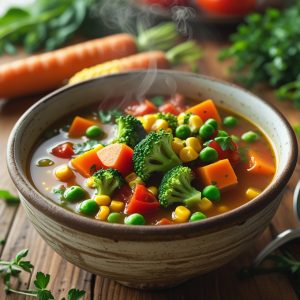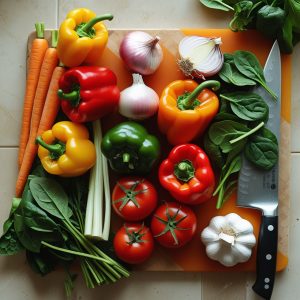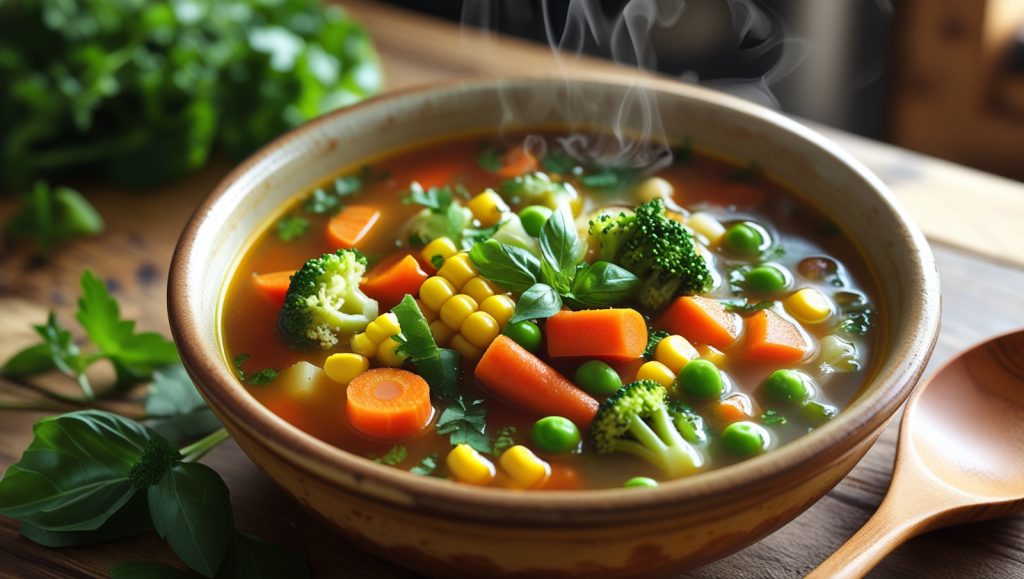Introduction

veg soup recipe Potatoes are among the world’s most important food crops, ranking third globally due to their high nutritional value and adaptability (FAO, 2019). They are a cost-effective and nutrient-rich food source, containing fiber, protein, vitamin C, B6, potassium, magnesium, iron, and phytonutrients (King & Slavin, 2013; McGill et al., 2013). Potatoes thrive in diverse climates and harsh environments, making them a reliable staple across six continents. They produce more calories and protein per unit of land and water than most other staple crops (Renault & Wallender, 2000).
Given their agricultural and economic significance, countries like India and China have implemented programs to boost potato production to meet rising food demands (FAO, 2019). With the growing global population and climate change challenges, there is an increasing need for new, resilient potato varieties that can adapt to different conditions. However, despite their importance, potato breeding programs have been slow, with many regions still depending on century-old varieties (Douches et al., 1996).
To address these challenges, breeders require advanced techniques to develop improved potato varieties that are resistant to pests, diseases, and environmental stressors. The USDA potato genebank in Sturgeon Bay, Wisconsin, plays a crucial role in this effort, housing nearly 2,000 potato accessions. Screening this extensive collection has led to the discovery of resistance genes against major potato diseases like late blight, zebra chip, and Colorado potato beetle (Karki et al., 2021; Mora et al., 2022; Jansky et al., 2009). However, efficiently using this genetic diversity requires better screening methods and the development of core collections.
Apart from potatoes, vegetable-based diets, especially soups and creams, are key to maintaining good health and balanced nutrition. These nutrient-dense meals provide essential vitamins, minerals, fiber, and antioxidants, which contribute to overall well-being. Research suggests that vegetable soups, whether fresh or dried, retain most of their nutrients, making them a beneficial addition to everyday meals (Buren et al., 2019).

Potatoes and Their Role in Food Security
Nutritional Benefits of Potatoes
Potatoes are often called a “complete food” because they contain:
- Carbohydrates: Provide essential energy.
- Dietary Fiber: Aids digestion and gut health.
- Protein: Supports muscle growth and repair.
- Vitamins C & B6: Boost immune function and metabolism.
- Minerals (Potassium, Magnesium, Iron): Essential for heart health, nerve function, and oxygen transport.
Due to their nutrient density and affordability, potatoes play a crucial role in global diets, especially in developing countries.
- Global Potato Production and Adaptability
Potatoes are widely cultivated because they:
- Require less water and land than crops like wheat and rice.
- Can be harvested multiple times a year in certain climates.
- Are resilient to environmental changes, making them ideal for climate-sensitive regions.
With India and China leading global potato production, their adaptability makes them a key crop for food security worldwide.
Challenges in Potato Cultivation and Breeding
Despite their benefits, potato production faces several challenges, including:
Vulnerability to Pests and Diseases: Potatoes are affected by late blight, bacterial wilt, and zebra chip disease.
Limited Genetic Diversity: Many farmers rely on older potato varieties that lack resistance to emerging threats.
Climate Change: Rising temperatures and unpredictable rainfall impact potato yield and quality.
To address these challenges, breeding programs must:
- Introduce genetic diversity from wild potato relatives for disease resistance.
- Develop climate-resilient potato varieties for better yield and sustainability.
- Improve screening techniques to select the best-performing potato strains.
The Benefits of veg soup recipe
- Nutritional Advantages of Vegetable Soups and Creams
Vegetable soups are rich in:
- Vitamins (A, C, K, B-complex): Strengthen immunity and support overall health.
- Minerals (Calcium, Magnesium, Iron, Potassium): Essential for strong bones and heart function.
- Fiber: Promotes digestive health and regulates blood sugar levels.
- Antioxidants: Help reduce the risk of chronic diseases like diabetes and heart disease.
-
Nutrient Retention in Vegetable Soups

Studies confirm that dried veg soup recipe retain most of their nutrients and fiber, making them an excellent food option. Research has found that:
- Dried soups contain 1–2.5 servings of vegetables per portion.
- Up to 80% of the recommended daily vegetable intake can be met through soups.
- The nutritional content of dried soups is comparable to homemade soups.
- Affordability and Convenience Vegetable soups are a low-cost, easy-to-make dietary choice. They are:
- Customizable: Ingredients can be modified to meet dietary needs.
- Satiating: High fiber content keeps you full longer.
- Hydrating: Their high water content aids hydration and digestion.
Conclusion: Advancing Sustainable Food Systems

Potatoes and vegetable-based diets are essential for global nutrition and food security. The high yield, affordability, and nutrient density of potatoes make them a staple food kitchen in many regions. However, improving potato breeding methods is crucial to ensuring sustainable production in the face of climate change and increasing food demand. The USDA potato genebank is an essential resource for preserving and utilizing genetic diversity to develop disease-resistant and climate-adaptive potato varieties.
Conclusion: The Power of a Nutritious Veg Soup Recipe
A well-prepared veg soup recipe is more than just a meal—it’s a powerhouse of nutrition, flavor, and comfort. Packed with essential vitamins, minerals, fiber, and antioxidants, vegetable soups support overall health, digestion, and immunity while being incredibly easy to prepare and customize. Whether you prefer a hearty vegetable soup for winter warmth or a light, refreshing broth for detox, the possibilities are endless.
One of the biggest advantages of vegetable soups is their versatility and adaptability. You can use seasonal vegetables, herbs, and spices to create a dish that suits your taste preferences and dietary needs. Plus, with the right ingredients, a homemade veg soup can be a great option for weight management, gut health, and boosting energy levels.
As we strive for healthier eating habits, incorporating nutrient-dense vegetable soups into our daily meals is a simple yet effective way to improve nutrition and overall well-being. Whether you’re looking for a quick and easy weeknight meal, a comforting dish for cold days, or a nutritious option to support a healthy lifestyle, a homemade veg soup recipe is always a great choice.
Start experimenting with your favorite vegetables, seasonings, and cooking methods, and enjoy the endless benefits of a delicious and nourishing bowl of veg soup.

